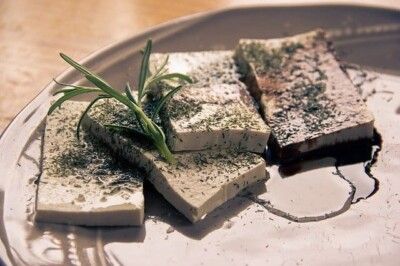
Vegan meat substitute put to the test
Meat substitutes are in vogue, whether it is seitan or tofu. This meat substitute is pure gluten protein that contains neither bran nor starch.
If you compare meat with soy and seitan, you can see that these contain almost as much protein as meat. Unlike meat, these also contain no uric acid and little fat.
The disadvantage, however, is that the healthy ingredients from wheat and soy, such as minerals, fiber and vitamins, are extracted during the protein production process.
Since the taste is usually rather neutral, many manufacturers unfortunately use too much fat, salt and sugar to intensify the taste.
This, of course, negates all the benefits that plant-based protein sources have.
Even in the vegetable minced meat there are often worrying additives such as smoke flavoring and acidity regulators.
In addition, the vegetable minced meat is enriched with a lot of fat and salt.
Instead of meat, prefer vegetable protein: peas, seitan and tofu
Vegetarian meat and sausage substitutes contain vegetable protein and are often vegan. The proteins contained are usually extracted from peas, wheat (seitan) or soy (tofu).
They were then concentrated and rehydrated with the help of oil and water.
However, a small number of products are vegetarian and not vegan. These are made on the basis of milk or chicken egg white.
Food intolerant and allergy sufferers must be careful
Those with a birch pollen allergy should be careful when consuming soy products. Here it can come namely due to a cross-allergy to allergic reactions.
Also who has a gluten intolerance or celiac disease should be careful and avoid seitan, because this is only a pseudonym for wheat protein gluten.
Often harmful additives in the meat substitute products
Many manufacturers use additives and flavorings to turn the proteins with oil and water into a product with a meat-like consistency, and then give the whole thing a spicy taste.
Often a lot of sugar is processed in the meat substitute. This can lead not only to overweight, but also to diabetes.
Also flavor enhancers such as glutamate are often used. Likewise, salt, up to two grams per 100 grams, is added to many products in quantities.
Six grams of salt per day is considered the maximum by the German Nutrition Society (DGE).
The meat substitute is also not lower in fat than normal meat and sausage products. The fat content here is often 10 to 20 percent.
It is not uncommon for methyl cellulose to be used as a thickener as well. The fiber is obtained from vegetable raw materials.
Sporadic consumption is considered safe, but animal studies show that methyl cellulose promotes intestinal inflammation.
Phosphates may also be present. These can have a detrimental effect on those whose kidneys are already damaged.
Green spelt, peas and lentils for vegan minced meat
Vegan meat for the preparation of classical meat dishes can be produced completely unproblematically by oneself.
For a meatloaf, for example, only green spelt (unripe spelt), peas and lentils need to be soaked overnight in beetroot juice.
The juice contains minerals, trace elements and vitamins. In addition, it still provides a meat-like color.
The peas are rich in fiber and B vitamins, the green spelt is bursting with magnesium, potassium and iron.
The lentils contribute then to the whole dish still zinc and calcium.
Meat substitutes are by no means necessary to eat a balanced and varied vegan or vegetarian diet.
Regardless of the type of finished product, a critical look should always be taken at the list of ingredients.
The shorter this is, the better this is for health.
However, when things have to go fast and snacks have to be provided for on the way, vegan meat is still a better alternative than cheaply produced meat from the supermarket.





